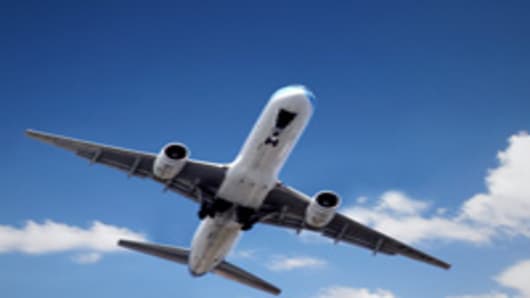Skyrocketing oil prices have hit the airplane industry hard, as they are now being forced to find ways to cut costs, rather than increase ticket prices.
Employment
When any industry faces increased costs, jobs are the first to get cut. According to global outplacement firm Challenger, Gray, and Christmas, so far this year the airline industry has eliminated nearly 22,000 jobs, in comparison with 21,710 for the whole year of 2007.
"The industry faces its worst crisis since 9/11," U.S. Continental Airlines Chairman and Chief Executive Larry Kellner and President Jeff Smisek wrote as a pair in a letter to employees.
In-flight Entertainment
Get ready for boring travel. Many airlines will begin to cut the entertainment on flights.
US Airways announced that starting in November it will no longer provide any films to view on domestic flights. The entertainment system amounts to 500 lbs., adding to the overall weight and forcing its transportation to require an even larger amount of fuel.
In addition, the quality of meals, as well as comfort, will also more than likely begin to deteriorate.
Number of Winter Passengers
According to Dow Jones, Irish low-cost airline Ryanair Holdings (RYAAY) is planning to further trim its cost base by cutting 14 percent of flights from its most expensive airport, London Stansted.
In its statement made on July 17, Ryanair said it would cut the number of planes based at Stansted this winter by 25 percent, from 36 to 28. The number of weekly flights from the airport will fall 14 percent from 1,860 to 1,600. It said the reduction will decrease the number of passengers it carries from the airport by about 900,000 compared with last winter.
"Ryanair confirms that it will lose less money this winter by sitting these eight aircraft on the ground, rather than flying them at an expensive airport like BAA Stansted during the winter when fares are extremely low, but oil prices remain stubbornly high," the company said in its statement.
Increased Charges
Although airlines are desperately trying to maintain fares, don't think they're not tacking on addition fees. Extra charges include, but are not limited to, booking fees, change-of-plan fees, airport improvement fees, pick-your-seat fees, curb-side check-in fees, baggage fees, paper ticket fees, in-flight amenities fees, fuel fees, and fees for redeeming vouchers.
As fuel prices continue to increase, weight-watching airlines are pushing more penalties on over-packed passengers. In September 2007, British Airways stopped accepting bags weighing more than 51 pounds.
The potential costs for an overweight bag range anywhere from $25 to $100, and anywhere from $10 to $80 per luggage exceeding the airline's checked-bag limit.
Retiring Old Aircrafts
Although not as many aircraft will take off this winter due to high oil prices, aerospace companies shouldn't worry. Many countries, such as the U.S., are seeking newer, updated aircraft models that are more fuel efficient to replace current ones.
"We (Engine-maker GE Aviation) are expecting record production for at least the next three years," David Joyce, CEO of GE Aviation explained at the 2008 Farnborough Air Show.
By using more gas-efficient aircrafts, less money will need to be spent on re-fueling.
Future Cuts?
Airlines will continue to find as many ways as possible to battle the fuel prices by cutting costs rather than raising airfare.
On July 8, MEP approved a compromised deal forcing all airlines flying to and from the EU to cut their carbon dioxide emissions.
Nuts picked from the Amazon rainforests helped Virgin Atlantic Airways fly a jumbo jet from London to Amsterdam, with one of its four fuel tanks filled with a blend, including coconut oil, producing less carbon dioxide than normal fuel jets.
"The airlines who will survive this period of higher oil prices and industry turndown are those with cheaper fuel efficient aircraft, lower costs, substantial cash balances, low net debt and management who are ready to exploit downturns to drive costs lower and increase efficiency," Chief Executive Michael O'Leary of Ryanair said.


